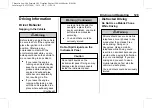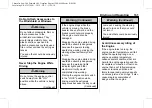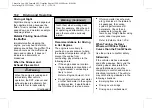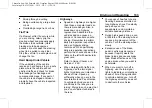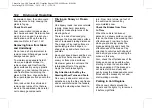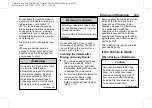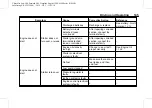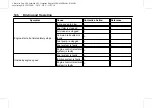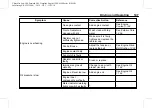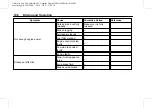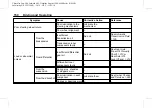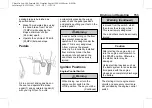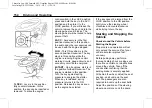
Chevrolet Low Cab Forward 6.0L Gasoline Engine 3500/4500 Series (GMNA-
Localizing-U.S.-12533400) - 2019 - CRC - 11/19/18
Driving and Operating
139
If the vehicle must be driven on a
flooded road or is parked in an area
that becomes flooded, promptly
perform a check for the following
points:
.
Effectiveness of the brakes
.
Water-ingress or damage to
drum brakes, disc brakes
.
Engine damage due to
water-ingress
.
Shorting of electrical
components
.
Oil level and degradation
(cloudiness) of the engine,
transmission, differential
.
Greasing of each components
(lubrication)
Steering
Do Not Leave the Steering
Wheel Fully Turned for a
Long Time
{
Warning
If you leave the steering wheel
fully turned for a long time, the oil
in the power steering oil pump will
become extremely hot. This
would cause poor lubrication, oil
tank damage and seal
deterioration, leading to power
steering oil pump damage, power
steering unit damage and power
steering hose damage. As a
result the steering wheel could
become extremely hard to turn
and a fire or other accident could
occur.
You and others could be seriously
injured.
Steering Wheel
If the steering parts have excess
play or looseness or if any abnormal
condition is noted, have the steering
system checked immediately.
Driving on Wet Roads
Driving on Slippery Surface or
Driving in Bad Weather (Rain,
Icy Roads, Snowy Roads, etc.)
In bad weather, visibility is reduced
and slippery road surfaces increase
stopping distances. Drive more
slowly than you would in good
weather. Also, avoid sharp turns of
the steering wheel and hard
braking. Use engine brakes together
with the foot brakes to decelerate.
You may not realize the surface is
slippery until the vehicle is skidding.
Learn to recognize warning clues
—
such as enough water or ice on the
road to make a "mirrored surface"
—
and slow down when there is any
doubt.





